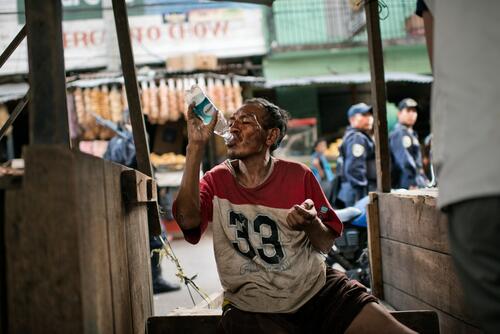The impact of violence in Central America and Mexico cannot be understated. Widespread violence and its dramatic medical consequences are threatening to become a humanitarian crisis, while health systems – already underfunded and short of medical staff – are unable to cope. The lack of adapted policies to respond to this emergency means that many survivors of violence are left without access to healthcare, support or protection. Médecins Sans Frontières (MSF) is launching a campaign to highlight this issue.
Guatemala, Honduras and Mexico have some of the highest homicide rates in the world. Criminality and violence have skyrocketed in recent years. In the midst of political, economic and social instability, the number of homicides has doubled in Honduras in the past five years, while the levels of violence in Guatemala City’s most deprived areas can be compared to those of a war zone, reminiscent of decades of civil conflict.
Thousands of sexual assaults are reported each year, while many more go unreported. In Mexico, on an average day, 50 people meet a violent death, 100 suffer some kind of violence-related disability, and 1,250 receive medical treatment for their injuries.
With violence being experienced on a daily basis in this region, it is no surprise that many people live in fear of being attacked, raped or killed. But the fact is that it is the most vulnerable in society who are most at risk: most victims of violence are concentrated in poor, deprived neighbourhoods, and belong to marginalised social groups – a situation further increasing their vulnerability. On top of this, those who survive rape, beatings or gunshot wounds frequently find themselves stigmatised for their injuries and discriminated against by people who assume they are connected to the criminal underworld.
Violence in Honduras and Guatemala
In the Honduran capital, Tegucigalpa, there is a violent death every 74 minutes. Admissions for violence-related injuries to the country’s main hospital have doubled in five years. MSF’s medical staff are working in the communities most at risk, addressing the medical consequences of violence among the injured and traumatised. In the 18 months up to September, MSF medical teams provided more than 10,000 consultations in the streets of some of the city’s poorest neighbourhoods, referring people in need of additional medical or psychological treatment to public health facilities supported by MSF. Over one quarter of these referrals were due to violence suffered in the previous six months.
In neighbouring Guatemala, MSF focus has been on the victims of sexual violence – MSF teams have treated nearly 4,000 victims in the past four years. Despite evidence that providing rape survivors with timely medical and psychological care is vital for their long-term health, rape is seen primarily as a legal issue in many countries. Until recently, Guatemala was no exception. Steps are now being taken in the right direction: the government has agreed that survivors of sexual violence may receive medical attention before reporting the crime, while government staff have begun to provide treatment for sexual violence survivors in public health facilities.
Struggling healthcare system
But in cities besieged by violence, the resources allocated to public health cannot keep up with demand. Governments prioritise investments in security and law enforcement, at the expense of the health sector, leading to regular shortages of medical supplies and drugs, particularly in local health centres. As a result, MSF has witnessed a shift in people’s behaviour. Many people no longer go to local clinics for basic healthcare consultations, resorting to private pharmacies – if they can afford it – or turning to the already overloaded emergency rooms of public hospitals. The struggling healthcare system is also hard-hit by shortages of medical staff, who are reluctant to work in insecure areas for fear that they too may become victims of violence.
The international community – country leaders, national civil societies, international cooperation agencies, humanitarian organisations, donors – is just waking up to this health crisis in Central America and Mexico, and international declarations and new funding pledges are being made. But for the needs of the most vulnerable to be met, there has to be a firm political commitment to respond urgently to the medical consequences of violence on people’s lives.



